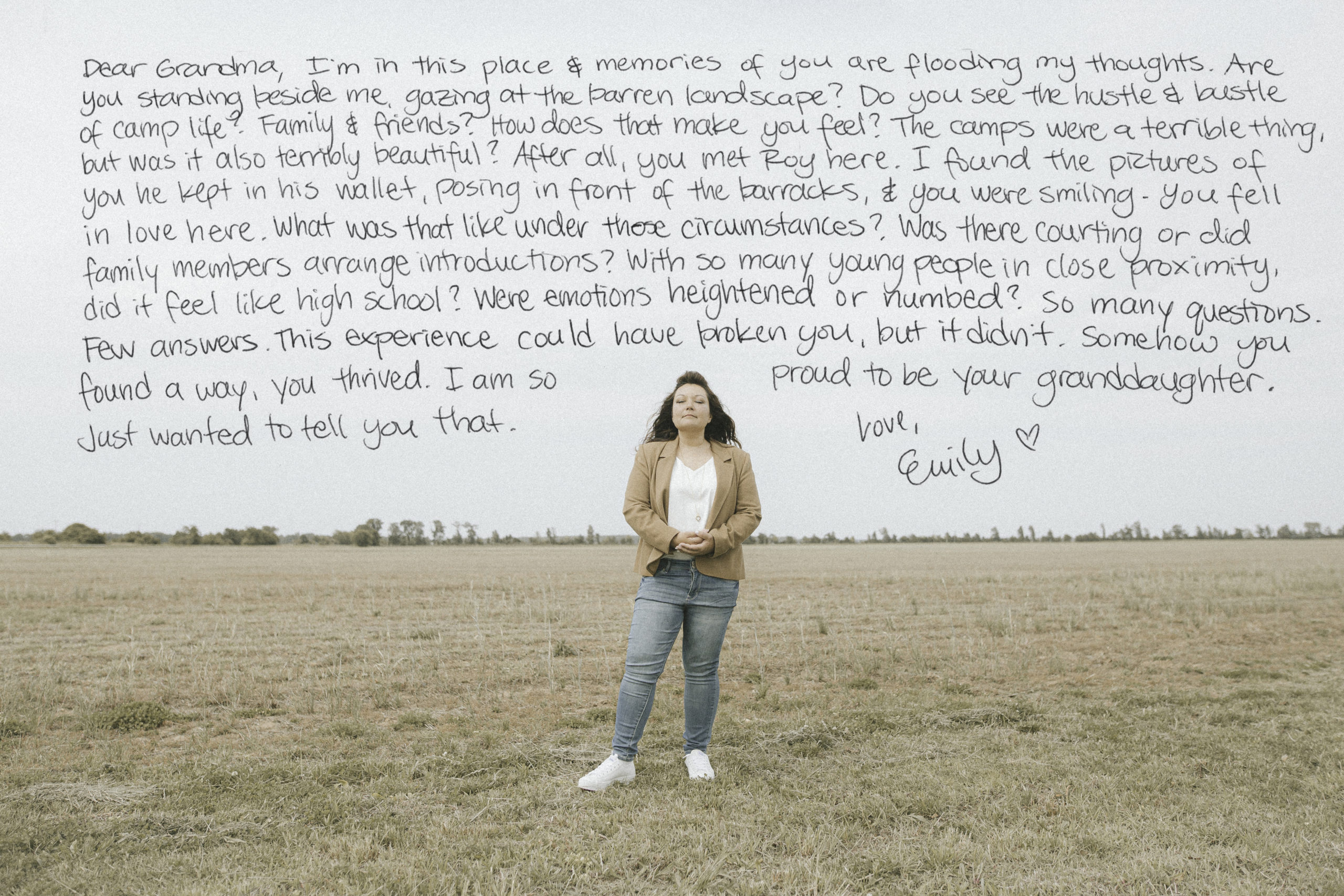“She never talked about camp in a negative way. I think it’s because although it was this difficult, horrible thing that happened, so much good came out of it for her and her family. She met her husband and was able to have a family because of it. They never would have met otherwise.”
— Emily Nariye Parola, on her grandmother

Lily Yuriye Matsumoto
Nisei
Lily Yuriye Matsumoto was born in Fresno, CA. She is the older sister of Ben Kazuo Matsumoto.
Before the war, Lily temporarily lived in Japan with her family to help her older sister raise her three children after her husband was detained overseas as a prisoner of war. Shortly after Lily and her siblings returned to the United States, Executive Order 9066 was issued and they were sent to the Santa Anita Assembly Center. Several months later, they were transferred to Jerome. Lily was in her late teens at the time.
Lily made nets for the U.S. Army and worked at a camp administration office during her time in Jerome. “They found ways to keep busy,” says her grand-daughter Emily. Lily eventually met her future husband Roy—also a Fresno native—in the Jerome barracks. After their release, Lily and Roy briefly lived in Chicago before moving back to their hometown Fresno to help with Roy’s family’s business Kogetsu-do, a Japanese bakery still standing today.
Kogetsu-do survived the war due in part to a neighbor who looked after it while Roy’s family was incarcerated. “We found out later that the neighbor was a gang leader […] or a pimp, or a combination of the two,” says Emily. Although Roy’s family was able to reclaim the business after their return from camp, they encountered subtle reminders of its previous management. “There would be ladies of the evening who would come into the store,” Emily says. “But my grandfather never treated them differently. I think there was a respect there.”
Years later, an attempt to fix a piping issue revealed an underground tunnel between the bakery and another building. “They were funneling who-knows-what between the two businesses,” says Emily. “And because my grandfather and his family didn’t ask any questions, I think it was just understood.”
Over the years, Lily helped stock the shelves and work the till at Kogetsu-do. However, when Roy passed away due to lung cancer, the bakery was kept within his side of the family, leaving Lily to raise her two children single-handedly. “She was a young widow,” Emily says. “Other than being able to type, she really had no skills. She didn’t know how to drive. She had no job of her own.” Lily put her children through school while working as an attendance officer at a local school. She mainly spoke about the positive experiences she had at camp until she passed away in 2017.

Lily’s information—her name misspelled—as it appears in the Final Accountability Roster for Jerome. Courtesy of Densho Encyclopedia.

Portrait of Lily with her husband Roy Ikeda. Courtesy of the Matsumoto Family Collection.

Lily poses in front of a barrack at Jerome, where she and her siblings were incarcerated shortly after returning from Japan. Courtesy of the Matsumoto Family Collection.

During her incarceration, Lily, pictured second from the left in the second row, worked at the camp administration office in Jerome. The War Relocation Authority generally encouraged the formation of incarceree-led newspapers, co-ops, religious organizations, and sports teams to improve quality of life in the camps. Courtesy of the Matsumoto Family Collection.

Interior of Kogetsu-do, Roy’s family’s bakery in Fresno, CA, circa 1924. Kogetsu-do survived the war due in part to a neighbor who looked after it while Roy’s family was incarcerated. Courtesy of the Matsumoto Family Collection.

Listen to this portrait.
Emily Nariye Parola
Yonsei
Emily Parola is the maternal grand-daughter of Lily Yuriye Matsumoto. She was born in Newport Beach, CA and raised in Irvine, CA.
Growing up, Emily says her grandmother spoke more openly about the incarceration with her than she did with her mother. “For my parents’ generation, I think it was all a mystery because their parents didn’t really talk about it,” she says. “But with me, there’s that time and separation. [My grandmother] was able to talk about it, finally.”
When her mother passed away in 2020, Emily was tasked with sorting through her personal belongings. Because she and her mother rarely spoke about their family’s incarceration, Emily was surprised to find that her mother owned books about Manzanar and that she was in the middle of putting together a family tree.
Emily shares that making a pilgrimage to Jerome is not only a way for her to honor her grandmother, but also her mother. “[I’m] doing it for my mom who couldn’t make it, for closure,” she says. “I think she would have wanted to do that for her mom as well.”


